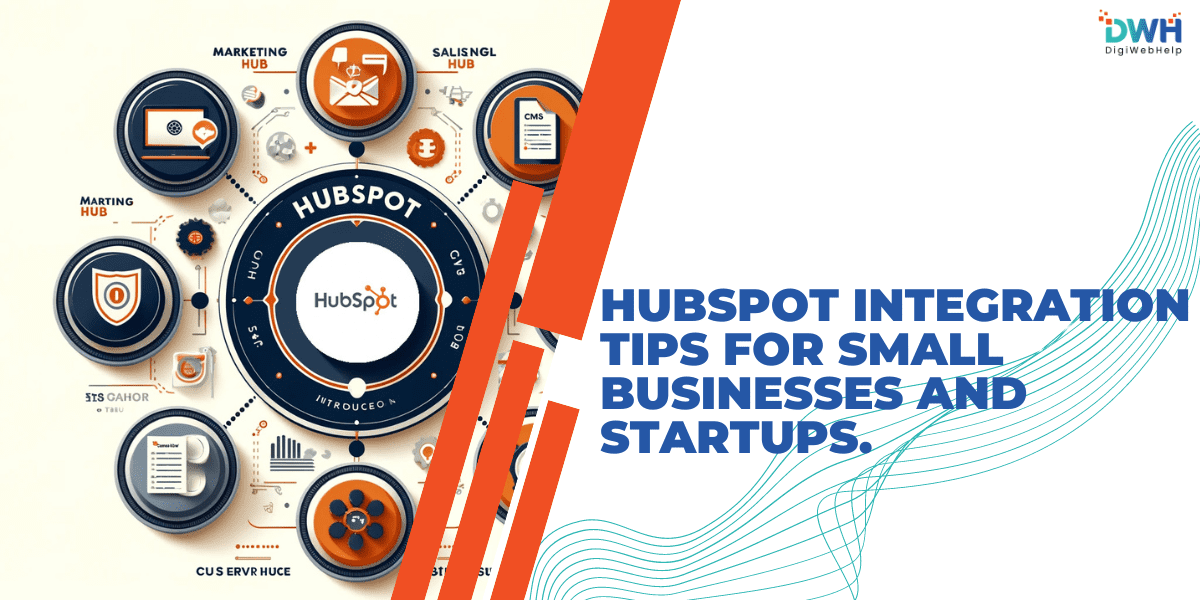
HubSpot Integration Tips for Small Businesses and Startups
Small businesses and startups often struggle with managing customer relationships, marketing campaigns, and sales without the right tools. Enter HubSpot. This all-inclusive platform has changed how businesses interact with their customers. HubSpot CRM, the heart of this system, provides an efficient and scalable solution that streamlines operations and fosters growth.
But what sets HubSpot apart is its ability to integrate with various tools and services, boosting its capabilities and giving businesses a unified system to manage various aspects of their operations. In this blog, we’ll explore the best practices and tips to integrate HubSpot.
Understanding HubSpot Integrations
HubSpot integrations are connections that allow HubSpot CRM to work seamlessly with other software systems. This allows businesses to create a cohesive workflow across different platforms. These integrations are designed to synchronize data, automate tasks, and provide deeper insights, all within the HubSpot ecosystem.
Types of HubSpot Integrations
- CRM Integrations: HubSpot CRM can be integrated with other CRM platforms such as Salesforce or Zoho CRM. This allows you to keep all customer data in one accessible place.
- Marketing Integrations: Integrate HubSpot with email marketing tools like Mailchimp or ActiveCampaign. This helps manage your campaigns, monitor performances, and nurture leads effectively.
- Sale Integrations: Integrate HubSpot with sales tools like LinkedIn Sales Navigator or SalesLoft. This can boost your sales processes, from prospecting to closing deals.
- Customer Service Integrations: HubSpot can be linked with customer support systems like Zendesk or Intercom. This provides seamless customer services and increases satisfaction rates.
- E-Commerce Integrations: For online businesses, integrating HubSpot with e-commerce platforms like Shopify or WooCommerce helps manage sales, inventory, and customer data.
- Communication Integrations: You can integrate HubSpot with communication tools like Slack or Zoom. This enhances the efficiency of both internal and external communications.
Step-by-Step Guide to HubSpot Integration
Integrating HubSpot into your existing tools can seem tough. However, with the right approach, it can become a simple and rewarding process. Here’s a comprehensive guide to help you get started on this journey.
1. Preparing Your HubSpot Account for Integration
Before starting, it’s important to verify that your HubSpot account is set up correctly. This includes configuring your CRM, setting up user permissions, and ensuring your data is clean and organized. Proper preparation ensures that your integration will work smoothly and your data remains accurate.
2. Selecting the Right Integration Partners
Choose the tools and platforms you want to integrate with HubSpot. Consider your business’s unique needs and select integrations that will offer the most value. HubSpot offers numerous integrations via its marketplace. Take your time to explore your options and choose the perfect fit for your business needs.
3. Setting Up and Configuring the Integration
After choosing your integration partners, the next step is to set them up. Follow the instructions provided by HubSpot and the third-party tool to connect the two systems. While setting up, it’s crucial to adjust features like data mapping, automation rules, and user permissions to ensure the integration works as intended.
4. Testing the Integration for Functionality and Data Accuracy
Once you have set up the integration, thoroughly test it to ensure that everything is working correctly. Check that data synchronization between HubSpot and the integrated tool automation rules are working correctly. Testing is crucial to identify and address issues before they affect your business process.
5. Training Your Team on Using Integrated Systems
Once the integration is working as intended, it’s essential to train your team on using the new system. Provide training sessions and resources to help them understand how the integration works and how it benefits their daily tasks. A well-versed team is more likely to use the integrated system effectively, maximizing the integration’s benefits.
Top HubSpot Integrations for Small Businesses
CRM Integration
One of the most powerful integrations for HubSpot CRM is with other systems like Salesforce or Zoho CRM. If your business is already using a different CRM, syncing it with HubSpot makes sure your customer data is updated and accessible on all platforms. With this integration, your sales and marketing teams be more efficient. They can track and manage all customer interactions within HubSpot.
Marketing Automation
Email marketing is a key component of most marketing strategies. Integrating HubSpot with email marketing platforms like Mailchimp or ActiveCampaign lets you control all your campaigns from HubSpot. You can track email opens, clicks, and conversions. You can use this data to nurture leads through targeted campaigns. HubSpot’s automated tools can trigger email sequences based on customer behavior. This ensures that your marketing efforts are always on time and relevant.
E-commerce Platforms
For businesses selling products online, it’s crucial to integrate HubSpot with their e-commerce platforms, such as Shopify or WooCommerce. This integration helps them track customer purchases, manage inventory, and analyze sales data directly through HubSpot. HubSpot’s marketing tools can also be used to create targeted campaigns based on past purchases. This helps drive repeat business and increase customers’ lifetime value.
Social Media Management
Social media is a powerful tool for reaching new customers and engaging with your audience. By integrating HubSpot with social media management platforms such as Hootsuite or Sprout Social, you can manage all your social media networks from one place. The allows you to schedule posts, monitor social interactions, and analyze your social media campaign performance all through HubSpot.
Conclusion
HubSpot integrations boost small businesses and startups by enhancing their operations, streamlining processes, and driving growth. By choosing and implementing the right integrations, businesses can unlock new efficiencies and offer improved customer service. Whether you are looking to boost your marketing, sales, or customer service efforts, HubSpot integration services can provide the right tools you need for success.










